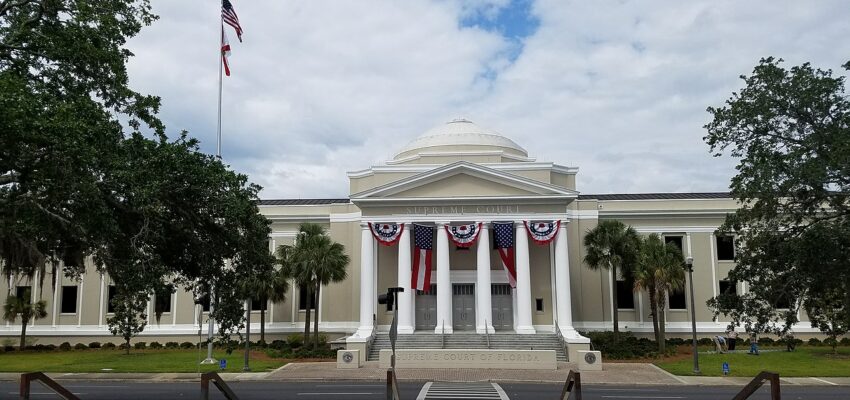
Supreme Court Upholds Free Speech Rights of Social Media Platforms
The Supreme Court firmly supported the platforms’ free speech rights on Monday by putting on hold Texas and Florida’s attempts to restrict how Facebook, TikTok, X, YouTube, and other social media companies govern information uploaded by their users.
Judge Elena Kagan stated in a court opinion that the platforms, like newspapers, should be shielded from government interference when it comes to deciding what is allowed and not allowed in their domain. “The curated compilation has moved from the physical to the virtual world, but the principle does not change,” Justice Kagan said in an opinion co-signed by five justices. On the overall result, all nine justices concurred.
The justices sent the cases back to lower courts so that trade associations representing the corporations could review them more thoroughly.
Both regulations, though differing in specifics, sought to allay long-standing conservative grievances that social media corporations had a liberal slant and restricted users according to their opinions, particularly those of the political right. The cases are just a few this term where the justices are debating what constitutes appropriate speech in the digital era.
In the months that followed Facebook and Twitter’s (now-X) decisions to ban then-President Donald Trump for his postings on his followers’ Jan. 6, 2021, attack on the U.S. Capitol, Republican governors signed the measures in Florida and Texas.
Trade associations, on behalf of the firms, filed a lawsuit in federal court, arguing that the rules infringed upon the platforms’ freedom of speech. A federal appeals court upheld the Texas law and knocked down the Florida statute. However, both were put on hold until the Supreme Court decided their case.
Despite the complexity of the cases, the judges made two unambiguous observations, according to First Amendment specialist and Notre Dame Law School professor Richard W. Garnett:
The First Amendment safeguards not just our speech but also our refusal to support, endorse, or say anything at all. In other words, editorial judgment is included in the freedom of speech. Whether the speaker is a single person or a major media organization, this is true, he stated.
“Secondly, the government cannot control speakers only to create what it believes would be a more vibrant or diversified marketplace of ideas. The choice of what is offered in that market ultimately rests with us.
Gov. Ron DeSantis declared in a statement that enacting the Florida legislation would serve as “protection against the Silicon Valley elites.”
Governor Greg Abbott declared that the Texas law was necessary to safeguard free expression in the “new public square” at the time it was signed. “There is a dangerous movement by social media companies to silence conservative viewpoints and ideas,” Abbott stated. “Social media platforms are a place for healthy public debate where information should be able to flow freely.” “That is incorrect, and Texas will not tolerate it.”
Yet a lot has transpired since then. After buying Twitter, Elon Musk renamed the platform and removed staff responsible for content moderation. It allowed back a large number of users who had been banned for using the platform to propagate conspiracy theories and engage in hate speech.
While cautioning the court to seek a narrow finding that maintained governments’ power to apply laws to foster competition, safeguard data privacy, and protect consumer interests, President Joe Biden’s administration sided with the challengers. In a brief submitted in the Florida case, attorneys for Trump urged the Supreme Court to uphold the state legislation.
Proponents of free speech celebrated the decision as a win.
Vera Eidelman, staff attorney with the ACLU’s Speech, Privacy, and Technology Project, said, “The court’s recognition that the government cannot control social media in an effort to impose its vision of what online speech should look like is crucial to protecting all of our rights to speak our minds and access information on the internet.” “It is essential to safeguarding everyone’s right to free speech and internet information access that the government cannot control social media in an attempt to impose its vision of what online speech should look like.”
“To protect all of our rights to speak our minds and access information on the internet, the court’s recognition that the government cannot control social media in an effort to impose its vision of what online speech should look like is crucial,” stated Vera Eidelman, staff attorney with the ACLU’s Speech, Privacy, and Technology Project. “To protect all of our rights to speak our minds and access information on the internet, the court recognized that the government cannot control social media in an attempt to impose its vision of what online speech should look like.”
A case from Louisiana, Missouri, and other parties accusing federal officials of pressuring social media companies to silence conservative points of view was dismissed by the court last week, one of several involving social media platforms that the justices have wrestled with over the past year.
